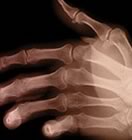| |

Arthritis
 ArthritisThere are over 100 different types of arthritis and rheumatic
diseases including osteoarthritis, osteoporosis, fibromyalgia and rheumatoid
arthritis. If you know someone who is suffering from stiffness or pain
in joints, the cause may well be arthritis which means inflammation
of the joints. For most people arthritis pain cannot be avoided as the
body ages and generally, people over the age of 60 show some signs of
arthritis. Joints naturally degenerate in flexibility and efficiency
over time. Family history, obesity and joint injury can also increase
the risk of arthritis affliction. ArthritisThere are over 100 different types of arthritis and rheumatic
diseases including osteoarthritis, osteoporosis, fibromyalgia and rheumatoid
arthritis. If you know someone who is suffering from stiffness or pain
in joints, the cause may well be arthritis which means inflammation
of the joints. For most people arthritis pain cannot be avoided as the
body ages and generally, people over the age of 60 show some signs of
arthritis. Joints naturally degenerate in flexibility and efficiency
over time. Family history, obesity and joint injury can also increase
the risk of arthritis affliction.
The most common type of arthritis is osteoarthritis. The main symptoms
are pain, stiffness and swelling of the joints. The joint may develop
restricted movement, and there may be some tenderness in the area. In
some cases the joint may also crack or creak. The pain is usually more
painful in joints that bear weight such as the spine, hip, knee and
shoulder joints. If not treated the joint may become badly damaged and
unstable, putting stress on the tissue and ligaments surrounding the
joints, ultimately leading to some form of deformity.
Osteoarthritis is a degenerative disease that most commonly affects
joints in the hands, wrists, knees, hips and feet. Surrounding each
joint is a protective capsule holding a lubricating fluid to aid in
motion. Cartilage, a slippery smooth substance, covers most joints to
assure a cushioned, even and fluid motion of the joint. As this cartilage
wears away due to time or injury it causes the membranes lining the
joints to become inflamed, with the possibility of bone rubbing against
bone. The bodies defence reaction can result in the edges of the bone
to thicken and change shape, these bony growths are called osteophytes.
Many people suffering from any type of arthritis experience some difficulty
functioning at home, at work or at play because of joint pain, stiffness
and loss of motion. Getting out of bed in the morning, writing, preparing
meals, dressing, walking, sleeping, climbing stairs and attending to
matters of personal hygiene may become difficult to some degree by arthritis
pain and joint stiffness. A lot of people find this impairment of mobility
more distressing to them than the arthritis pain itself.
Fortunately, arthritis can be managed through a combination of medication,
weight-management, rest, nutrition, and possible surgery. It is important
to stress that relieving the stress on your joints by controlling
or reducing your weight is vital, as is some form of light, regular
exercise
such as swimming or cycling. If you feel you are suffering from arthritis,
consult your GP who can start a treatment plan that will help protect
your joints and lessen the arthritis pain. Arthritis is a chronic
disease that can be with a person for a long time and possibly for
the rest
of their life. The treatments a person receives will change over time
and medication may be adjusted. Keeping a positive mental outlook
and with the support of family and friends a person can live with
arthritis
and be able to continue his or her daily activities.
Maintaining a
sensible weight can help reduce your chances of developing arthritis.
Check whether you have a healthy weight on our BMI Calculator.
|
|



![]()
 ArthritisThere are over 100 different types of arthritis and rheumatic
diseases including osteoarthritis, osteoporosis, fibromyalgia and rheumatoid
arthritis. If you know someone who is suffering from stiffness or pain
in joints, the cause may well be arthritis which means inflammation
of the joints. For most people arthritis pain cannot be avoided as the
body ages and generally, people over the age of 60 show some signs of
arthritis. Joints naturally degenerate in flexibility and efficiency
over time. Family history, obesity and joint injury can also increase
the risk of arthritis affliction.
ArthritisThere are over 100 different types of arthritis and rheumatic
diseases including osteoarthritis, osteoporosis, fibromyalgia and rheumatoid
arthritis. If you know someone who is suffering from stiffness or pain
in joints, the cause may well be arthritis which means inflammation
of the joints. For most people arthritis pain cannot be avoided as the
body ages and generally, people over the age of 60 show some signs of
arthritis. Joints naturally degenerate in flexibility and efficiency
over time. Family history, obesity and joint injury can also increase
the risk of arthritis affliction.